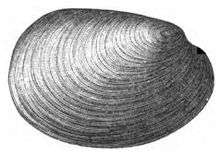1881 in paleontology
Paleontology or palaeontology (from Greek: paleo, "ancient"; ontos, "being"; and logos, "knowledge") is the study of prehistoric life forms on Earth through the examination of plant and animal fossils.[1] This includes the study of body fossils, tracks (ichnites), burrows, cast-off parts, fossilised feces (coprolites), palynomorphs and chemical residues. Because humans have encountered fossils for millennia, paleontology has a long history both before and after becoming formalized as a science. This article records significant discoveries and events related to paleontology that occurred or were published in the year 1881.
Molluscs
Bivalves
Dinosaurs
Newly named dinosaurs
Pterosaurs
New taxa
Synapsids
Non-mammalian
| Name |
Status |
Authors |
Discovery year |
Age |
Unit |
Location |
Notes |
Images |
| Aelurosaurus |
Valid |
Owen |
|
|
|
|
|
|
|
Paleontologists
- Death of the Reverend William Fox a significant early collector of dinosaur fossils from the Isle of Wight.[4]
References
- ↑ Gini-Newman, Garfield; Graham, Elizabeth (2001). Echoes from the past: world history to the 16th century. Toronto: McGraw-Hill Ryerson Ltd. ISBN 9780070887398. OCLC 46769716.
- ↑ Elicki, O.; Gürsu, S. (2009). "First record of Pojetaia runnegari Jell, 1980 and Fordilla Barrande, 1881 from the Middle East (Taurus Mountains, Turkey) and critical review of Cambrian bivalves" (PDF). Paläontologische Zeitschrift. 83 (2): 267–291. doi:10.1007/s12542-009-0021-9.
- ↑ Sánchez, T.M. (1999). "New Late Ordovician (Early Caradoc) Bivalves from the Sierra de Villicum (Argentine Precordillera)". Journal of Paleontology. 73 (1): 66–76. JSTOR 1306745.
- ↑ Farlow, James O.; M. K. Brett-Surmann (1999). The Complete Dinosaur. Bloomington, Indiana: Indiana University Press. p. 15. ISBN 0-253-21313-4.



